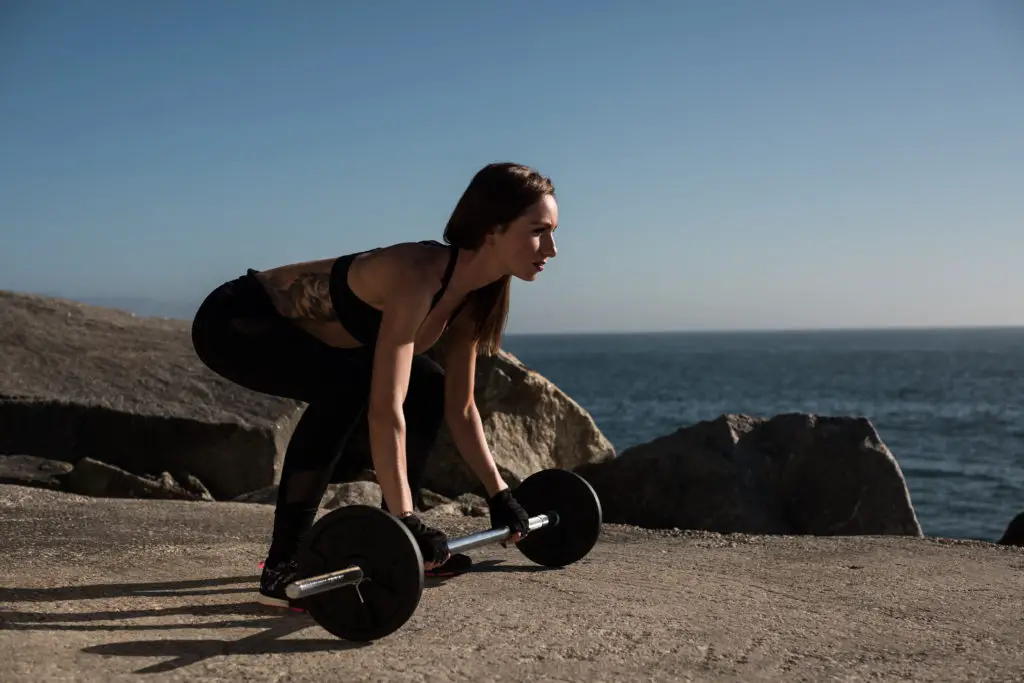
Weight training is an excellent way to build your muscles and get into shape. If you have an exercise area outdoors, you might be worried about the problems you could face if your weights get wet. To have continuous, successful workouts, you will benefit from weights that are in tip-top shape. So, is it bad for weights to get wet?
It is bad for weights to get wet over and over again. Cleaning them is one thing, but leaving them outside for extended periods of time can be detrimental in several weather conditions. It is important to take care of your weights so they will last.
Read on to learn more about the negative effects of your weights getting wet, along with tips on how to make your weights last in any outdoor situation. Metal weights are prone to rust, while rubber weights can be damaged from too much exposure to UV radiation. In any case, you should take precautions to protect your weights.
Page Contents
So, is it Bad for Weights to Get Wet?
It is bad for weights to get wet, but maybe not for the reason why you might think. Yes, wet weights can be dangerous to use as they can be slippery and might result in injury, but there is more than that.
Science Backed Reason Why It’s Bad
If you are at all familiar with the science behind corrosion, you probably already know this, but metal weights will rust quicker if they get wet. Over time, metal is bound to rust no matter what.
When iron weights are exposed to air, the air tends to break down the iron into other chemicals. Thus, the metal begins to rust. If you add water to this equation, the corrosion process happens much quicker, resulting in weights that will not last for a long time.
If you have an outdoor gym or your weights are more likely to get wet than not, you might be thinking to yourself that you do not care if your weights rust. While it can be a nuisance to handle rusty weights, it is also a safety hazard.
Rusted Weights are Dangerous to Your Health
Rusty items present a high risk of tetanus, a bacteria-born infection that can lead to other problems. So, even if you handle rusty weights with the most cautious efforts, the risk is still there.
If you are still not convinced that rusty weights are bad, consider other pieces of your outdoor workout equipment. If you have a bar for bench press, squats, or anything else, it can be bad for it to continuously get wet. Think about the friction caused when lifting, thrusting, or twisting a weight bar during any weight training. If that bar is rusty, you are much more likely to cause chipped pieces of metal to at least stain your skin, not to mention the risk of penetration creating a wound.
You should also consider an item such as an entire weight bench getting wet. Yes, the part you lay or sit on might be made of soft padding separating you from the metal frame body, but the pieces that hold the bench together are most likely made of metal bars and screws holding those pieces together. If these pieces rust, your bench might start falling apart.
It is bad for your weights to get wet over and over again. At the very least, you should regularly wipe off wet weights and other workout equipment if it is likely to be wet before or during your workout. You can still have a functioning exercise area outside, but without basic upkeep, it may not last as long as you want it to.
Is it Bad to Lift Weights in the Rain?

Lifting weights in the rain is both similar and much different from simply asking if it is bad for weights to get wet. While there are proven benefits to working out in the rain, you should still be careful.
Even if you are more likely to work harder and burn more calories while working out as cold water pours down your body, there are obvious risks that should be avoided:
- Never workout during a storm
- Always be careful how much weight you lift
- Keep your weights protected
The first thing you should avoid is a given. If you work out outside during a thunderstorm, you are putting yourself in danger. Especially if you are using any type of weight or equipment with metal on it, lightning is an extremely high risk. If it is raining hard, you should be okay for the most part, but any sign of a storm should immediately show you that you should take your workout inside.
If you are working out in the rain, you should also carefully monitor how much you are lifting. Yes, you might be able to lift a large amount of weight, but wet weights can lessen your ability to grip as tightly. If you are working with heavy weights, be careful that you do not overdo it and lift too much for a wet grip to handle.
While working out in the rain, you should also mind your weights. If you are outside, your weights will inevitably get wet. However, leaving them flat on the ground can cause them to become overly drenched, making them rust quicker if they are metal or become water-logged if they are rubber. Make an effort to rest your weights against something so that they are not laying flat in the water.
Can I Wash My Weights?
As long as your weights are not exposed to water constantly, you will not have to worry about them rusting too quickly. As said before, most cases make it impossible to avoid rust altogether, but excessive rain will speed that process up. You might want to wash your weights from time to time to make sure they stay in the best condition possible.
You can wash weights, but whatever solution you use, you must make sure to wipe your weights thoroughly after washing them. If too many chemicals or too much water is left on them to air dry, they can become damaged more quickly.
Oftentimes, weights are made of basic metal or rubber materials that are not made to withstand unusual chemicals. If you wash your weights, make sure that they are completely dry before you are done with them.
Can the Sun Damage Weights?

When considering the effects of the sun on your weights, accelerated rusting might not be a problem. So, for metal weights, the main thing you will have to worry about is touching them if they have been baking in the heat. On the other hand, rubber or plastic weights are prone to damage from UV radiation.
As previously mentioned, materials like rubber – and in this case, plastic – are not put on weights because of their durability in different weather conditions. The sun’s radiation is highly likely to damaged synthetic material if it is left out in the sun, so if you have rubber or plastic weights, UV damage can be accelerated much more quickly than rust for metal weights.
The Key Takeaway
It is bad for weights to get wet too often. If you take the necessary precautions before, during, and after your workout, you will be able to keep your weights outside while allowing them to last as long as possible.
Too much water on weights will accelerate the corrosion process, resulting in sub-par weights that may not be of any use to you. Whatever weather conditions you’re dealing with, make sure to do your research on how to maintain the conditions of your weights.
If you do use weights that have gotten wet, be sure to dry them off thoroughly before using them to avoid rust and other damage. And if your weights do get wet, you can try to dry them off as much as possible and then store them in a dry place.
You can also try wiping them down with a cloth or towel to remove excess water. If the weights are very wet, you may need to let them dry completely before using them again.
It is generally best to store weights in a dry place to prevent rust and other damage. This can help ensure that your weights remain in good condition and are safe to use.
